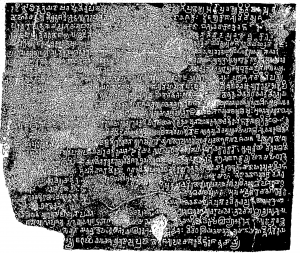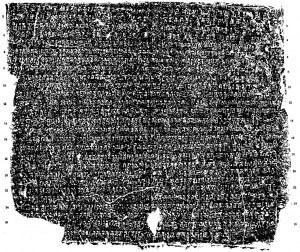

This stone inscription, in cave 16 at Ajaṇṭā, was first published in 1862 by Dr. Bhau Daji. As with the other stone inscription in cave 17 at Ajaṇṭā, this inscription has been damaged by exposure to weather. The inscription was written for Varāhadeva, a minister of the Vākāṭaka king, Hariṣeṇa. The inscription records the excavation and decoration of a cave dwelling, which both Mirashi (1963: 104) and Shastri (1997: 42) believe refers to the creation of cave 16 itself, where the inscription is found at Ajaṇṭā. The donation was made to an order of Buddhist monks.
1. Having first saluted (Buddha who is renowned) in this world for the removal of the intense fire of misery of the three worlds (about 9 letters lost), I shall relate the genealogy of the king (or kings).
2. Vindhyas’acti (flourished), whose power extended over the great and (brave ?)―even by the angry devas (about 10 letters lost), prowess in protection and liberality, the twice-born, illustrious in the world.
3. In prowess comparable to Purandara (Indra) and Upendra (Vishnu), earned by the might of his arm (about 13 letters lost), was the lion of the Vákátaka race.
4. Proud as a lion …………… who has eclipsed the sun by the aggregation of (battles ?) (about 14 letters lost), has made enemies, and skilful in discussion (about 4 letters lost).
5. Him . . . who conquered enemies, who has performed the duties of men and kings ……. made the greatest effort regarding meritorious deeds ……. Vidvatka (about 4 letters lost). His feet, a lotus kissed by the rays of the jewels set in the crowns of kings.
6. Pravarasena. . . . (his) son was, as the sun’s rays are proper to the expanding fresh lotus (about 14 letters lost) ; whose army was excellent to govern (to punish ?)—to him was born a son, who conquered all armies.
7. His son, the chief of kings …… (5 letters lost) (adorned ?) the earth by Dharma; Kuntala (about 5 letters lost) was the king’s son, excellent (pravara), powerful, liberal, and skilful in governing (pravara).
8. (About 4 letters lost) . . . . Ilis son. . . . (about 14 letters lost) reign of Pravarasena. . . . who when eight years old governed the kingdom well.
9. His son (was ?) (4 letters lost) Deva Sena, in this world, whose beautiful enjoyments (about 3 letters lost) Bápya (about 6 letters lost) earth, for the kind’s power of merit.
10. Raja. . . . (about 7 letters lost)……… the resort of good qualities……. illustrious in the world (was) Hasti Bhoja ……. prasa he whose breast was large and powerful, and (to him ?) whose eyes arc like the lotus ……. kshapi.
11. (About 19 letters lost). . . . afterwards, he who resembled the elephants (at the eight quarters), benefactor, humble ……. a favourite (of the king ?)…….. imitator or the conduct, indestructible.
12. (19 letters lost) Kaschata …….. (one letter lost), who, possessing a mind inclined to the well-being of the people, for the happy and excellent protection ……. of (4 letters lost) . . . . ever kind as a mother, and easily accessible as a friend, flourished.
13 (About 21 letters lost) ………. by a ……… (4 letters lost) the king, being at peace, entrusted his affairs (to his minister ?) and, although accustomed to act without restraint, abandoned all enjoyments. Then succeeded his son (about 14 letters lost) ……… hara (4 letters lost) ……. vihára isháná ……… whose prowess and glory were like those of Hari ; he Kuntala, Avanti, Kalinga, Kos’ala, Trikdta, Lata, A’ndhra (conquered?).
14. (About 19 letters lost) ……… by his faultless qualities.
15. (About 9 letters lost) by his faultless qualities, the son of Hasti Bhoja, celebrated in this world, became the minister of that king—the whole earth.
16. (About 20 letters lost) whose mind was firm, courageous, who was endowed with liberality, mercy, charity,—was devoted to religion and governed the country with justice. . . . (was surrounded with) the rays of glory, mercy, and good qualities.
I7. (About 6 letters lost) Shaha (about 11 letters lost) made the greatest increase of merit (about 3 letters not made out clearly) (about 6 letters lost)—he—at the time more ……. (works ?) made prisons—life, age, wealth, and happiness.
18. (Words altogether of 17 letters not well made out, but evidently meaning) for the benefit of mother and fnther, established the house (cave ?) (about 12 letters lost). . . . rudhatá … in the great hill occupied by Bhujagendra.
19. (About 6 letters lost) —pa—(about 10 letters lost) the spot covered with creepers, &c.— windows (three letters lost)—Vithivedika (2 letters lost) draknupramadyascha. . .. the arrangement of pleasing pillars.
20. (About 7 letters lost) cold (12 letters lost) Talasannuti) about 6 letters lost) delightful—(about 7 letters lost) (containing?) the great place of rest, nugendra palace, &c.
21. (About 5 letters lost) ramanása (about 15 letters lost)—rays (about 3 letters lost) where there is an opportunity of enjoying extreme happiness.
22. (About 3 letters lost) the magnificence of kings’ palaces …….. the cave of Mandara (about 20 letters lost) —as wished— (about 4 letters lost). … on the most beautiful mountain.
23. (About 4 letters lost) by me made ? Videha (about 16 letters lost)—whose birth.name was, whose humility was expanded by pleasing favours, and whose mind was not crooked.
24. (About 3 letters lost) Laya (absorption) the glory of the crowns of chiefs of gods (about 18 letters lost) ……… by circumstances was, Varáha Deva, having enjoyed the pleasures of kings.
25. (About 4 letters lost) the good Sugata, the well-stored cloud, body of snake (about 6 letters lost) disposition —as long as by the bright rays, so long ought inner hall to be used.
26. (About 10 letters lost)—the three jewels (1 letter lost) (3 letters not well made out)—the mountain resorted to by the great, and whose top is occupied by caves of various kinds.
27. (About 10 letters lost) (may) the world also—enter, from the destruction of collective and individual evils, the painless, fearless, peaceful and excellent abode.